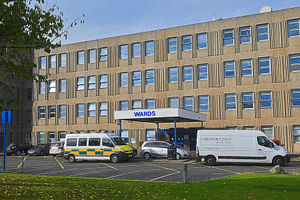Woman died in Shrewsbury hospital after mistake over injection
A Shropshire woman died in hospital after medication was mistakenly injected into an artery instead of a vein, an inquest heard.

Sally Ann Kirkpatrick died after being administered drugs by an anaesthetist at the Royal Shrewsbury Hospital after she suffered septic shock.
The health trust which runs the RSH and Telford's Princess Royal Hospital has introduced new procedures in the wake of Mrs Kirkpatrick's death on November 26 last year.
Coroner Mr John Ellery, speaking at her inquest yesterday, said lessons would need to be learned.
Mrs Kirkpatrick, 50, from Bishop's Castle, had suffered two episodes of severe septic shock close together before anaesthetist Dr Allinson Ayodele Abayomi administered medication to help treat her, the inquest at Shirehall in Shrewsbury was told.
Dr Louise Sykes, consultant in anaesthesia and intensive care at the Royal Shrewsbury Hospital, apologised to Mrs Kirkpatrick's family, saying she was "so sorry" for what had happened.
She said Mrs Kirkpatrick was very unwell and had suffered two episodes of severe septic shock – a life-threatening condition that happens when the blood pressure drops to a dangerously low level after an infection.
Giving evidence, Dr Sykes said: "Even without the complications of the medical procedure she was very poorly and sepsis shock has a high mortality.
"I think the mistake was made because Mrs Kirkpatrick's output was so poor and I don't think the doctor could see the artery pulsating as normal.
"I expect it was not obvious that it was in the artery. She was on a lot of drugs.
"The weak pulse in the artery may have led one to believe it was a vein."
"Under normal circumstances there would have been bright red blood spurting if an artery was hit.
"I think she was sicker than I appreciated.
"I don't think I appreciated quite how poor her cardiac output was.
"Dr Allinson Ayodele Abayomi has put in central lines before and I was happy he was competent. I could have easily done the same thing on the same patient.
"I am so sorry. It is a terrible thing that has happened.
"I saw the chest X-ray and thought the line was in the appropriate place in the vein.
She said that out of 1,000 cannulation procedures to insert lines into a vein, this was "the only fatal one I know of at the trust".
"To prevent it happening again to anyone else we have introduced new procedures," she added.
Dr Abayomi said he had performed the procedure more than 450 times before.
He said: "I was very, very surprised when I was told the line went into the artery. Normally when you hit one it is recognisably immediately."
Mrs Kirkpatrick's husband John said: "Sally was desperately ill and the medical staff did all they could."
Mr Ellery said: "The doctors are greatly experienced and there were no immediate signals or triggers to say it was in the wrong place.
"The trust has acknowledged the lessons learnt and are acting on it.
"I will share this with NHS England so lessons learned can be shared outside the trust."
Mr Ellery recorded a conclusion of complication of a medical procedure.
Speaking after the hearing, Mark Cheetham, scheduled care group medical director at Shrewsbury and Telford Hospital NHS Trust, said: "I would like to offer our deepest sympathies and apologies to the family of Mrs Kirkpatrick and we fully accept the findings of today's hearing.
"The care of our patients is central to everything we do. When something like this happens it is important that we learn from it and make sure that we improve, and we are doing that.
"Where appropriate, retraining is taking place and we have also put in place new procedures to prevent this rare complication from happening in the future.
"We are also currently exploring ways of increasing consultant input into the intensive care unit at the Royal Shrewsbury Hospital. We will be discussing this at trust board level in the near future."





